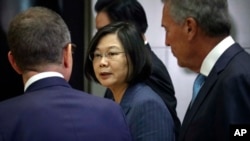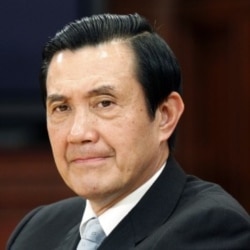On a two-day visit to New York this month, Taiwan President Tsai Ing-wen vowed in a speech never to “succumb to any threats” from China. She mixed too with U.S. Congress members in America’s largest city. Reporters were allowed to cover some of her events. It is more open and welcoming than past U.S. trips by Taiwan presidents.
Tsai, passing through New York on her way to visit former diplomatic allies in the Caribbean, will return to Taipei after spending another two days in the United States before July 22.
In the past, Washington has held visits by Taiwanese presidents to shorter periods, smaller cities and lower-profile activities – sometimes just aircraft refueling. The idea was to offer transit stops, for comfort and convenience, but avoid upsetting China. China sees self-ruled Taiwan as part of its territory rather than a state entitled to foreign relations. Washington and Beijing recognize each other diplomatically.
Tsai is getting to do more than usual this month because the U.S. government is upgrading relations with Taiwan and expressing exasperation with China, experts believe.
“At this moment, I think both the Taiwan government and the U.S. government prefer to see this as kind of a one-step further enhancement of diplomatic relationships,” said Liu Yih-jiun, public affairs professor at Fo Guang University in Taiwan.
Time, place and activity upgrades
Taiwan presidents have been allowed stopovers in the United States since the 1990s. They are officially transit stops between Taipei and visits to diplomatic allies in the Americas and South Pacific.
In 2006, Taiwan ex-president Chen Shui-bian stopped in the relatively remote city of Anchorage for a simple refueling – and he complained then of inconvenience. But Chen had ruffled the United States by provoking China at a time when U.S. officials hoped the two Asian governments would seek peace.
Seven years later, Taiwan’s ex-president Ma Ying-jeou visited New York for 40 hours but avoided slamming China in any meetings there. Ma had set aside disputes with China to start landmark negotiations with the Communist government.
Last August, in a move that upset China, Tsai became the first Taiwanese president since the 1970s to visit a U.S. federal property, the National Aeronautics and Space Administration.
Shift in U.S.-China-Taiwan ties
China has blamed Tsai for shunning more negotiations. Unlike Ma, she rejects Beijing’s dialogue conditions that both sides fall under one flag.
U.S. policy toward stopovers has not changed over the years, said Aaron Huang, acting spokesman for the de facto U.S. embassy in Taipei. But the Trump government has tightened Taiwan-U.S. ties by offering military aid for Taiwan as well as support for more high-level visits.
Trump, unlike his predecessors, is battling Beijing over trade. He is resisting Chinese military expansion in the South China Sea at the same time, largely by sending Navy ships and enlisting help from third countries.
The length of Tsai’s U.S. stays this month, the choice of New York as a venue and China’s past criticism of Tsai will stir China again, said Yun Sun, East Asia Program senior associate at the Stimson Center think tank in Washington.
“I think from those perspectives, her visit will be interpreted as more provocative than otherwise it would have been,” Sun said.
Between her U.S. stops, Tsai is scheduled to visit Haiti, St. Lucia, St. Vincent and the Grenadines and St. Kitts and Nevis. Beijing protested before Tsai started her journey.
Washington next?
Tsai hopes to grow closer with the United States, especially as China pressures her toward talks through military aircraft flybys and squelching Taiwanese foreign relations, political scientists in Taipei say.
But with U.S. stopovers routine, Taiwanese voters hope their president can take her U.S. visits even further, said Ku Chung-hua, standing board member with the Taiwan advocacy group Citizens’ Congress Watch.
Common Taiwanese often resent China’s pressure and hope the U.S. government can help in their defense.
Tsai almost got the chance earlier in the year, when a group of U.S. senators asked, unsuccessfully, that she be able to address Congress.
“If she went and spoke to the U.S. Congress, that would be a big breakthrough, but if she’s just passing through for a few nights, though there’s some relaxation compared to the past, it doesn’t change approval ratings that much,” Ku said.





